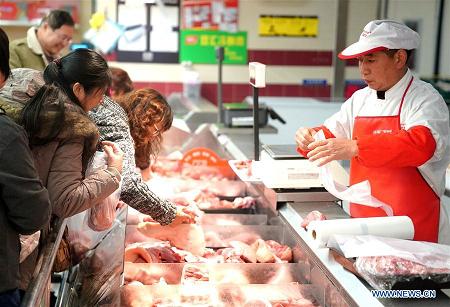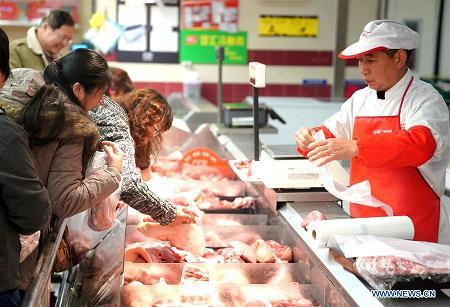
Customers purchase meat in a market in Ningxia Road in Shanghai, east China, Dec. 9, 2017. China's consumer inflation slowed more than expected to grow 1.7 percent in November driven by falling food prices, the National Bureau of Statistics (NBS) said Saturday. The consumer price index (CPI), a main gauge of inflation, rose 1.7 percent year on year in November, down from October's 1.9 percent, and missing market forecast of 1.8 percent. (Xinhua/Chen Fei)
BEIJING, Dec. 9 (Xinhua) -- China's consumer inflation slowed more than expected in November, and producer inflation at the factory gate fell sharply, leaving room for prudent monetary policy to be maintained.
The consumer price index (CPI), a main gauge of inflation, rose 1.7 percent year on year in November, down from October's 1.9 percent, and missing the market forecast of 1.8 percent, the National Bureau of Statistics (NBS) said Saturday.
The CPI has grown at less than 2 percent for 10 straight months, pointing to mild inflation in the world's second-largest economy.
NBS statistician Sheng Guoqing attributed the slowdown in CPI to a decrease in food prices, which account for a significant part of the CPI calculation.
Food prices fell 1.1 percent in November year on year, 0.7 percentage point more than the decline registered in October. Pork prices slumped 9 percent, dragging down the CPI growth by 0.25 percentage point.
On a month-on-month basis, food prices fell 0.5 percent. Prices of pork, aquatic products and fresh vegetables declined on abundant supply. Costs of beef, lamb, egg and fresh fruit rose on rising demand.
Non-food prices edged up in November on both a yearly and monthly basis.
Non-food costs rose 2.5 percent year on year, 0.1 percentage point higher than the increase posted in October. The costs of health-care, housing and culture and entertainment led the gains.
On a monthly basis, non-food prices gained 0.1 percent. Fuel and diesel prices rose more than 3 percent. Clothing costs increased 0.7 percent.
China's producer price index (PPI), which measures costs for goods at the factory gate, rose 5.8 percent year on year in November, according to the NBS.
It was down from growth of 6.9 percent recorded in October, on par with the market forecast.
On a monthly basis, it was up 0.5 percent. In the first 11 months, PPI climbed 6.4 percent from one year earlier.
As northern China enters the winter heating season, the government has increased efforts to tackle smog, asking steel mills and smelters to halt production to curb pollution. Those measures have cooled demand for industrial raw materials.
Compared with a month ago, factory-gate prices grew faster in oil and natural gas developers and ferrous metal producers. Costs increased at a slower pace in oil processing and chemical-producing industries, Sheng noted.
Compared with a year ago, raw materials costs rose 7.5 percent, 1.5 percentage point down from that recorded in October.
Liu Liu, a researcher with the China International Capital Corporation Limited, anticipated that as Spring Festival approaches, vegetable prices will rebound, and CPI inflation still faces upward pressure.
Despite the drop in the prices of non-ferrous metals and paper-making industries, the overall PPI still faces upward pressure. However, due to a high base effect, PPI growth will fall further in December, he said.
November's inflation reading stayed well within the government's 3 percent target in 2017. Analysts said the mild inflation will not change the central bank's monetary stance.
China set the tone of its 2017 monetary policy as prudent and neutral, keeping appropriate liquidity levels but avoiding excessive liquidity injections.
China will continue its prudent and neutral monetary policy and improve coordination with other related policies to facilitate supply-side structural reform, according to the third quarter monetary policy implementation report released by the People's Bank of China.
China's GDP expanded 6.8 percent year on year in the third quarter, down from the second quarter's 6.9-percent increase, but above the government's targeted growth of around 6.5 percent for the year.




 A single purchase
A single purchase









